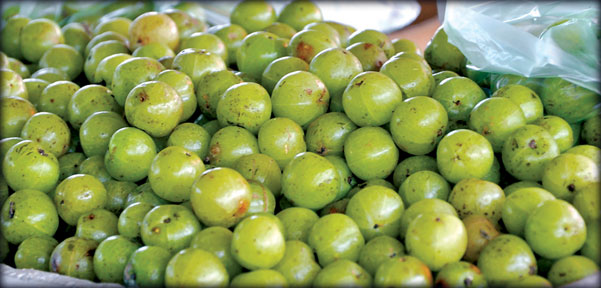Ayurveda’s wonder fruit : Nelli
by Shari Jayawardhana
Phyllanthus emblica known as the Indian Gooseberry in English and
Nelli in Sinhala is a small-to-medium-sized tree reaching 8 to 18 m in
height which naturally grows in forests of the tropical Asian countries.
The fruit is nearly spherical, light greenish yellow, quite smooth and
hard on appearance, with six vertical stripes or furrows.
The tree is easy to grow, fire resistant, free of pests and diseases
and needs little care.
 Nelli is a popular backyard crop that is commonly seen in Sri Lanka.
The tree is suitable to be cultivated in fire prone arid and semi-arid
areas of Sri Lanka. The Nelli tree is a common tree that is used for the
rehabilitation of degraded wastelands and also for agroforestry. The
tree is commonly used in the Asian region for conservation purposes and
for the restoration of barren lands. In Sri Lanka, the Nelli trees are
used as attractive ornamental plants to decorate avenues, streets, parks
and riverbanks. Nelli is a popular backyard crop that is commonly seen in Sri Lanka.
The tree is suitable to be cultivated in fire prone arid and semi-arid
areas of Sri Lanka. The Nelli tree is a common tree that is used for the
rehabilitation of degraded wastelands and also for agroforestry. The
tree is commonly used in the Asian region for conservation purposes and
for the restoration of barren lands. In Sri Lanka, the Nelli trees are
used as attractive ornamental plants to decorate avenues, streets, parks
and riverbanks.
Indian gooseberry
The fruits of the Nelli tree come into bearing in Sri Lanka from
December to March. The taste of the Indian gooseberry is sour, bitter
and astringent, and it is quite fibrous.
The Nelli tree is considered to be a very sacred tree in Sri Lanka,
particularly among the rural people. The tree is considered to wash away
the sins of the people.
Planting a Nelli tree is considered a sign of spirituality. The fruit
is the most commonly utilised part of the tree. The mature fruits are
edible and high in nutrition. The Nelli fruit is one of the riches
sources of Vitamin C among the tropical fruits. 100g of Nelli contains
600 -1,300mg of antioxidant ascorbic acid. The fruit is eaten raw or
used for cooking.
A common way to preserve the fruit is to dry it as it only loses 20
percent of its vitamin content within one year of refrigeration. The
fruit is made into a sweetmeat with sugar and prepared as a pickle. It
is also made into jam, jelly, syrup, candy, dried chips, chutney,
cordial or juice. The fresh Nelli fruit is baked into a tart, added to
other foods as flavouring during cooking and the juice is also used to
valour vinegar. Both the ripe and the half ripe fruits are candied as a
whole. It is used to give acidity to many of the dishes and is often
used as a substitute for tamarind.
The Nelli fruit contains 30 percent - 50 percent of pulp. The pulp of
the Nellie fruit is rich in protein, fibre, calcium, vitamin C and
riboflavin.
The importance of the Nelli fruit for the practice of the traditional
Sri Lankan Veda healing system has been well documented. The dried fruit
is used as one of the ingredients which constitute the well-known
Ayurveda blend known as Trippala. Nelli is commonly prescribed by
Ayurveda physicians to promote longevity, enhance digestion, treat
constipation, reduce fever, purify the blood, reduce cough, alleviate
asthma, strengthen the heart, benefit the eyes, stimulate hair growth
and enhance intellect. The dried fruit is used as a cure for diarrhoea,
dysentery, haemorrhage, anaemia, jaundice, dyspepsia. Boiled Nelli
leaves are very effective for skin eruptions.
A paste made from the leaves is used for eczema and wounds. An
infusion of leaves with fenugreek seed is given to patients with chronic
diarrhoea. Like the fruits, the barks and the roots are also used to
make traditional medicines. The seeds are used to treat asthma and
bronchitis.
Every part of the Nelli tree is highly valued in commerce. Among many
other benefits, the Nelli tree provides subsistence for rural folks and
generates international revenue through herbal formulations.
Nelli is a multi-purpose tree used for medicinal purposes, dyes for
fabrics and tannins, wood, fire wood and green manure. It is
commercially used to produce herbal shampoos and hair oils as it is
traditionally believed to nourish the hair and scalp and prevent
premature grey hair.
Nutritional composition
Product diversification of Nelli is taking place mainly due to its
rich nutritional composition. Nelli is now available in the
international market in capsule and tablet form. It is used also in the
preparation of indigenous and modern medicine. Fodder and organic
compounds are extracted from leaves, fruits, bark and trunk.
Commercial industries such as pharmaceuticals, leather, dyeing,
chemicals, oil, beverages and cosmetics use Nellie as a natural
ingredient. Although Nelli has a wide array of domestic and industrial
uses, the potential of the Nelli tree is yet to be explored fully in Sri
Lanka.
However, the demand for Nelli is steadily increasing due to its
medicinal uses and its ability to make high quality dye and tannin.
Nelli can be cultivated in many parts of the country. It has potential
to create livelihoods for many rural Sri Lankans. There is an urgent
need to facilitate the improvement of planting material and encourage
product development, innovation and diversification. |

